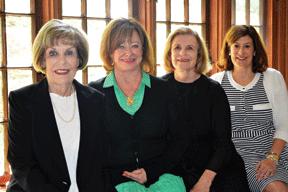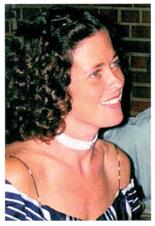
Elizabeth Prostic was young, married for only a few years and the mother of a new baby. A native of Kansas City, Elizabeth had all the things many of us hope for when she was suddenly struck down by breast cancer. Elizabeth died from BRCA gene breast cancer, a mutation that if detected early can minimize your risk.
Now her parents, Kansas Citians Dr. Edward and Merry Prostic, hope they can change the fate of so many others with this mutation through education. {mprestriction ids="1,3"}The Prostics have endowed The Elizabeth Prostic Memorial Outreach Program through the University of Pennsylvania’s Basser Center for BRCA, a leading institution for the research and treatment of breast cancer associated with the gene.

This new educational program will be kicked off in Kansas City at 7:30 p.m. on Thursday evening, Sept. 17. The program will take place in the White Theatre of the Jewish Community Campus and is open to the entire community. The free program is sponsored by the Prostics, the Women’s Philanthropy of Jewish Federation of Greater Kansas City, and the University of Pennsylvania’s Basser Center for BRCA. The evening will include top medical and genetic experts discussing the BRCA gene, risks and potential action steps as well as personal stories from BRCA gene breast cancer survivors and previvors.
The BRCA mutation is not common in the general population but one in 40 individuals of Ashkenazi Jewish descent will carry a BRCA gene mutation — at least a 10 times greater probability than the general population. Both men and women can carry the BRCA gene but women with the mutation have an 80 percent lifetime risk of developing breast cancer.
“My husband Edward and I created this outreach program at The Basser Research Center to honor our daughter on the 10th anniversary of her death,” Merry Prostic said.
“Elizabeth was tested the day that she passed away; her virulent breast cancer was caused by a mutation of the BRCHA 1 gene. This information was used to guide prophylactic treatment of other family members. We hope that others can avoid this preventable disease. With knowledge comes power,” she continued.
The evening presentation will include a discussion of the impact of BRCA gene mutations, genetic testing and risk management strategies, and the most cutting-edge cancer and prevention research. KSHB Channel 41 Midday anchor and breast cancer survivor Cynthia Newsome will moderate a panel of experts on the subject. Panelists include Dr. Susan Domchek, medical oncologist and executive director at the Basser Center; Debra Collins, (MS, LCGC) a genetic counselor at the University of Kansas Medical Center; Julie Levine and Kathy Andres, BRCA mutation carriers. A dessert reception will follow the presentation.
Julie Levine received her Stage 3 Breast Cancer diagnosis in May 2008. She underwent chemotherapy before surgery, had some genetic testing and was not too concerned because there was no known history of cancer in her family. But that would soon change.
“It was shocking to find out that I was a carrier of the BRCA2 gene and it was also shocking to find out that my father was the carrier,” Levine said. “I didn’t know anything about this mutation before I was diagnosed.”
Levine will share her story at the Sept. 17 program.
“I feel it is my responsibility to educate people about this mutation,” Levine said. “Knowledge is power, and had I known I was a carrier of this gene, my life would be a lot different right now. I hope that those in attendance learn what the implications of this mutation are, not only for themselves, but for their children.”
Unlike Levine, Kathy Andres came from a family with a long history of cancer including one sister with breast cancer and one with ovarian cancer. Both sisters tested positive for the BRCA gene, as did Andres; she soon took action undergoing a bi-lateral mastectomy with reconstruction.
“There was never a doubt in my mind that I would have the surgeries,” Andres said. “I have felt nothing but gratitude for being blessed with this knowledge and the ability to do something about it. It was for my kids.”
Andres, who is known as a previvor, is looking forward to sharing her story during the September educational program.
“I feel so privileged to be a small piece of this and help them through my own experience,” she said.
The Sept. 17 outreach program is free, but reservations are requested by calling the Federation office at 913-327-8100 or by email to .{/mprestriction}